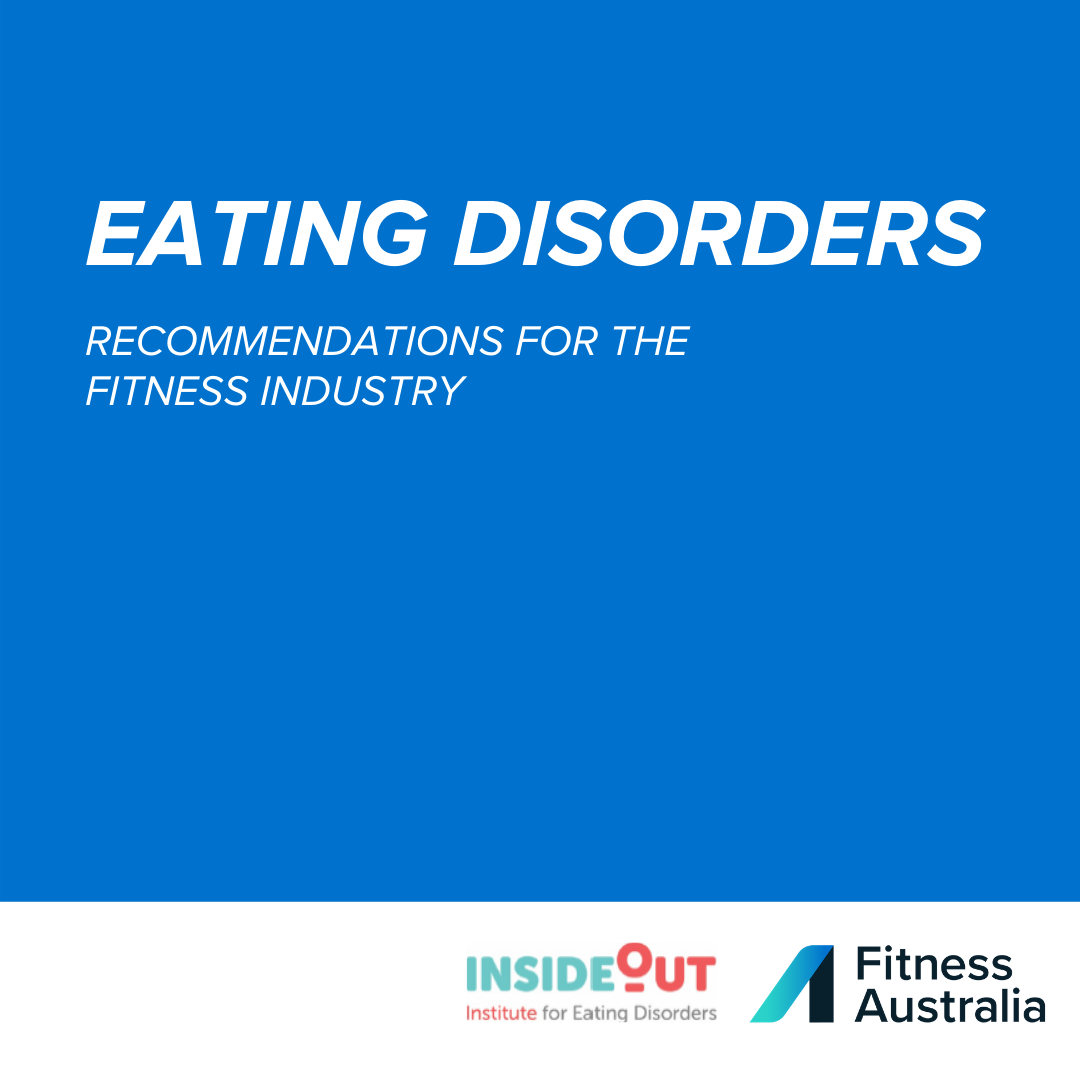InsideOut Institute for Eating Disorders and Fitness Australia co-launch new recommendations for the identification and support of those living with eating disorders.
Eating disorders have low detection and intervention rates, gyms and fitness clubs are at-risk settings for the presentation of eating and exercise disorders, and as such present an opportunity to increase identification.
Eating Disorders: Recommendations for the Fitness Industry has been developed to help fitness businesses and exercise professionals work effectively with people who have an eating disorder, exercise disorder or muscle dysmorphia.
The recommendations have been written and reviewed by a team of experienced mental health, medical and fitness professionals, as well as researchers and policy experts.
Dr Sarah Maguire, Director of InsideOut Institute, a collaboration between University of Sydney’s Charles Perkins Centre and Sydney Local Health District says:
“Gyms and fitness facilities are one of the most important commercial settings for the identification of eating disorders and early intervention.”
“Eating disorders frequently present within the fitness industry, have a high prevalence among sports people, and have high mortality rates, posing a significant issue for professionals who are not necessarily trained in the management of this illness group.”
“Fitness professionals do not receive routine training in mental health first aid and need to be equipped with the skills to address these high prevalence disorders in their work settings.”
“People working in the fitness industry are really on the frontline when it comes to eating disorders. We are hopeful this set of recommendations can promote the early identification of eating disorders, and sensitive and appropriate handling of people who present with symptoms.”
“We commend Fitness Australia for working with us to develop and implement these guidelines and for addressing this important health concern within their environment,” adds Maguire.
Fitness Australia CEO Barrie Elvish says personal trainers, fitness instructors and fitness businesses managers have an important role to play when it comes to eating and exercise disorders.
Elvish says:
“We want our Registered exercise professionals to have access to the best available training, including training on how to be part of the solution for people with eating disorders.”
“We always want them to be working within their scope of practice including knowing when and where to refer a client for medical review. Exercise professionals can also play a vital role in recovery, by working collaboratively with a treatment team.”
“Exercise professionals and fitness businesses can help reduce risk by having a positive approach to promoting physical activity and health – instead of one that focuses on guilt and shame around weight and shape. We’d love to see these practical recommendations used in all fitness settings across Australia as an industry standard.”
Australian cricketer Sarah Coyte is a personal trainer with a lived experience of an eating disorder. Coyte has played in three Ashes series and four World Cups and ranks among the best female bowlers in the world.
“I have struggled with an eating disorder since I was a teenager. It has stolen years of my life even when I was competing on the world stage.”
The eating disorder continued to worsen until Coyte had to step away from cricket for a season. Coyte has now returned to Domestic cricket and works as a personal trainer at a gym in Campbelltown.
“I still struggle with the eating disorder, but this year is the best year of cricket. I’m happier in everything I do, I’m eating pretty well and consistently, and my training has been good.”
“I know first-hand how hard it can be navigating the pressures of elite sport and the harm that an eating disorder can do. I over-trained and did not eat enough – I thought that’s what I had to do to perform at my best.”
She says that her lived experience of having an eating disorder informs the way she handles her clients.
“I check in with people who I think might be at risk, because I know that the earlier these things are picked up, the greater the chance of recovery.”
“These recommendations are an important guide for people working in fitness. They can help us identify when there is a problem and know how and when to step in, what to do and who to refer the client to.”
For further information contact
InsideOut Institute: Steph Boulet 0424 722 407, stephanie.boulet@sydney.edu.au or Fitness Australia: Angela Palogiannidis 0405 106 360, angela@fitness.org.au
The InsideOut Institute – a collaboration between Sydney Local Health District and the University of Sydney’s Charles Perkins Centre – aims to ensure every Australian living with an eating disorder has access to the best possible care by rethinking eating disorders from the ‘inside out’. Visit insideoutinstitute.org.au



